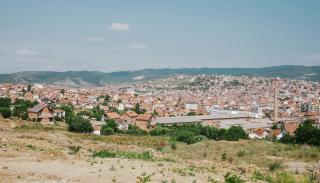
Breadcrumbs navigation
Catharsis, rearticulation of desire and ontological insecurity
Filip Ejdus and Marina Vulović discuss the key arguments from their new Review of International Studies (RIS) article. If you'd like to know more you can read the full article here - Catharsis, rearticulation of desire and ontological insecurity: The case of Serbia’s attachment to Kosovo
In this article we advance the field of Ontological Security Studies (OSS) in International Relations (IR) by introducing catharsis, a previously overlooked affective mechanism, as central to understanding radical identity transformations in world politics. Drawing on Lacanian psychoanalysis, we posit that states and other collective actors sustain ontological security through fantasies structured around “objects-cause of desire” (objets petit a), which promise identity closure but never truly deliver. The crux of our argument is that these objects are not static as they can be rearticulated over time through catharsis, expressed either as metaphor (replacement by a new signifier) or metonymy (replacement by a related part). The article illustrates this theoretical innovation through the case of Serbia’s shifting symbolic and emotional attachment to Kosovo.
Ontological security and its Lacanian reworking
As we show in our article, OSS has relied on three main perspectives: sociological, existentialist, and psychoanalytic. The sociological strand, drawing on Anthony Giddens, sees ontological security as continuity in self-identity sustained by routines. It emphasises anxiety as a paralysing force, overcome through adaptation or reaffirmation of identity. The existentialist view treats anxiety as a permanent human condition that can be faced authentically or inauthentically. Finally, the psychoanalytic strand, especially inspired by Lacan, views ontological security as an unattainable fantasy meant to fill a primordial void. From this perspective, states are always-already incomplete subjects that seek wholeness by attaching desire to symbolic objects that appear to offer closure.
We identify a key gap in all three perspectives: while they explain how actors maintain identity and manage anxiety, they do not adequately theorise the affective process (beyond anxiety) through which identity changes. To address this, we bring into the picture the Lacanian concept of catharsis. We define catharsis as the affective mechanism that allows repressed desires to resurface and be redirected toward a new object-cause of desire. In particular, we argue that this process either takes the form of metonymy, displacing desire to a part of the original object, or the form of metaphor, replacing tne object with an entirely new one.
Catharsis and the mechanics of desire in IR
In Lacanian theory, subjects are fundamentally lacking and structured by desire. This desire is sustained by objets petit a, symbolic placeholders that temporarily offer the illusion of wholeness. These objects are embedded in larger fantasies, which grip political subjects through their emotional power and promise of ontological fulfillment. However, because they can never fully satisfy, these fantasies eventually break down. The moment of catharsis occurs when repressed desires emerge and allow for the substitution of one object-cause of desire with another.
We argue that the mechanism of substitution operates through the forms of metaphor or metonymy. In metaphor, the entire fantasy shifts, one object-cause of desire is replaced with another from a different semantic and symbolic register. In metonymy, a part of the original fantasy stands in for the whole. Importantly, this substitution only becomes hegemonic if the new object is affectively compelling enough to secure emotional investment from the collective subject. We apply this conceptual framework to the evolution of Kosovo’s role in Serbian national identity, exploring both successful metaphorical substitutions and a more recent failed metonymic attempt.
Case study: Kosovo as Serbia’s object-cause of desire
We provide three empirical examples of cathartic rearticulations of Serbia’s desire, all revolving around Kosovo. The firstone is related to metaphoric substitution from Bosnia to Kosovo in the late 19th century. Following the two uprisings against the Ottoman Empire (1804, 1815), Serbia initially directed its territorial and symbolic aspirations toward Bosnia and Herzegovina. However, when the Austro-Hungarian Empire claimed Bosnia after the 1878 Congress of Berlin, Serbia redirected its national desire toward Kosovo. This metaphoric shift redefined Kosovo as the cradle of Serbian medieval glory, anchored in the myth of the 1389 Battle of Kosovo and the cultural legacy of the Nemanjić dynasty. This rearticulation established Kosovo as Serbia’s object-cause of desire, embedding it deeply in national identity.
The second example analyses metaphoric substitution from communism to nationalism in the 1990s. After the death of Tito and the collapse of Yugoslav communism, Serbian identity experienced a void. This was filled by reviving medieval nationalist myths, particularly those tied to Kosovo. The Nemanjić monasteries and sites like Gazimestan became symbolic anchors of national revival. Through metaphoric condensation, the fantasy of a future classless communist society was replaced with one of a glorious medieval past. The Serbian Orthodox Church, political elites, and media propagated this new fantasy, emotionally investing the population in Kosovo as a sacred ontic space.
Finally, the third example draws on ethnographic, archival and media data to investigate a more recent failed metonymic substitution attempt from southern to northern Kosovo. In 2018, Serbian President Aleksandar Vučić and Kosovar President Hashim Thaçi discussed a land swap: Serbia would give up claims to most of Kosovo in exchange for retaining control over North Kosovo. To facilitate this metonymic substitution, Serbian officials and media revived interest in medieval Queen Helen of Anjou’s submerged heritage beneath Lake Gazivode, located in North Kosovo. A documentary was announced, and local legends were elevated into national narratives, presenting North Kosovo as a site of lost Serbian medieval glory.
However, this effort failed to generate widespread affective investment. Surveys showed that the majority of Serbs, including those in North Kosovo, opposed partition. The Serbian Orthodox Church publicly denounced it, and Helen of Anjou’s heritage, submerged, invisible, and weakly embedded in the nationalist canon, could not compete with the vivid, pilgrimage-centered religious heritage of the southern monasteries. The attempt at metonymic deferral collapsed under the weight of an indivisible nationalist fantasy in which all of Kosovo remains Serbia’s ontological anchor.
Conclusion
The article’s core contribution is the theorisation of catharsis as an affective mechanism of radical identity transformation in IR. This concept enables scholars to better explain why and how states or national communities rearticulate their deepest symbolic investments. Rather than treating identity change as merely a rational adaptation to external events, catharsis highlights the emotional and unconscious dimensions of political desire. In addition to shedding light on two forms of the affective mechanism of catharsis, metaphor and metonymy, the empirical analysis reveals that not all substitutions are successful: affective resonance, narrative coherence, and symbolic visibility are essential for a new object-cause of desire to take hold.
We conclude that ontological security is not a stable condition but a dynamic, precarious process sustained by shifting fantasies, even though the duration of that shift can sometimes last for decades. Catharsis is central to this process, enabling political subjects to substitute failed fantasies with new ones. However, not all substitutions succeed, and the affective force of a new object must outweigh the existing one.
Future research could explore catharsis across other political contexts, compare metaphor vs. metonymy as substitution strategies, and analyse the cathartic mechanisms of other actors such as Kosovo, whose own object-cause of desire may be shifting from international recognition to asserting control over North Kosovo. This theoretical innovation, combining Lacanian psychoanalysis with IR, opens new pathways for understanding identity, affect, and desire in global politics.
Photo by Mario Heller on Unsplash


